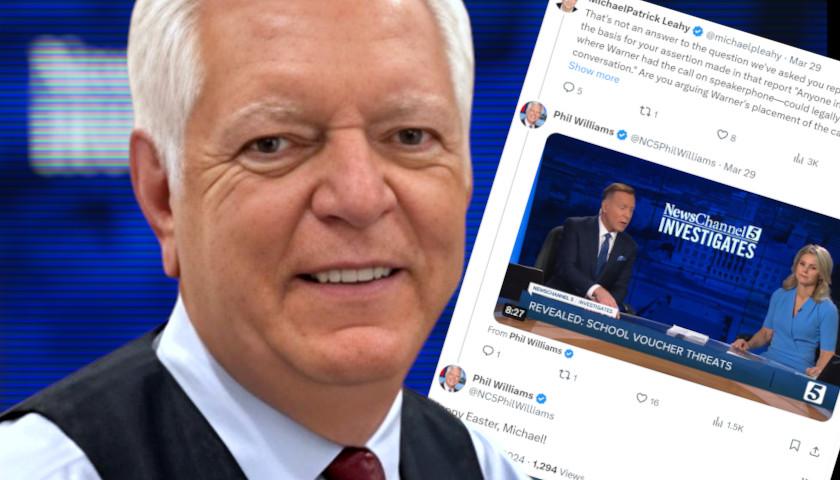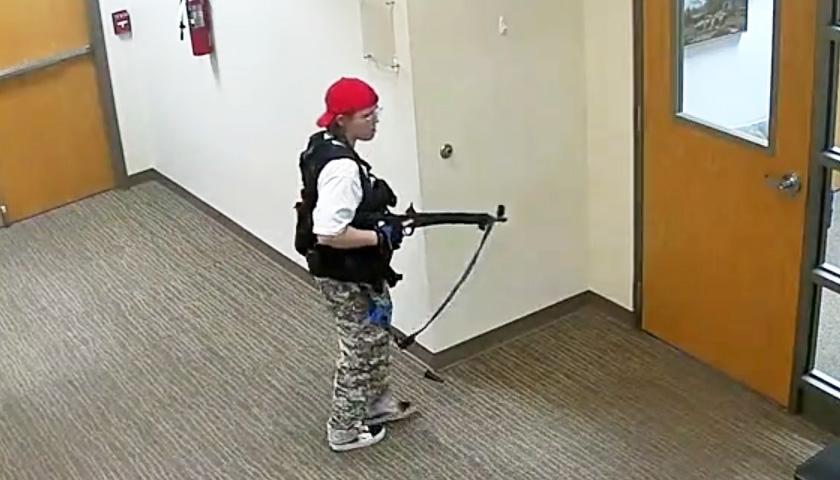Live from Nashville, Tennessee Friday morning on The Tennessee Star Report with Michael Patrick Leahy – broadcast on Nashville’s Talk Radio 98.3 and 1510 WLAC weekdays from 5:00 a.m. to 8:00 a.m. Jeff Webb, founder, and chairman of The New American Populist (TNAP) joined Leahy on the newsmakers line.
During the third hour, Webb discussed his recent op-ed in the Washington Times which delineated his boldly proposed Temporary Income Replacement Act. He explained the Act as one with limits and could only continue by a two-thirds majority House vote preventing it from never-ending. Webb said that action must be taken now as families are hurting and capitalism cannot endure long term hardship.
Leahy: We are joined now by our good friend Jeff Webb. Memphis entrepreneur. Founder of Varsity Brands. The inventor really of the cheerleading industry as we know it today. He also just started a great political organization American Populist.
Jeff, yesterday you had an op-ed in the Washington Times. Very interesting. You said Congress should OK a one time $3,000 cash payment to every American. Explain why you think that’s a good idea.
Webb: Good morning Mike. Everybody, the Congress, the President, and the administration and everybody are wrestling with how much money to get to our citizens now in light of the existing crisis and how to do it. Who’s going to qualify and so on.
To me, there are two things that are of primary importance here. This is why the proposal gets out in front of theirs and it’s bolder and I think it would be more effective. That is the amount of money and timing. We have not seen a crisis like this certainly in my lifetime.
And there are so many people and in my company that are concerned about what’s going to happen. They are concerned about what’s going to happen to their family. There are so many people in industries that are already laid off. Over 40% of Americans live paycheck to paycheck.
40%. They don’t have savings to address the situation that they have now and to make up for the income they are losing. There is so much anxiety. And I think that anxiety just exacerbates things.
John Carney at Breitbart a few days ago came up with the idea of taking the $1,000 per month or perhaps it’s the idea he got from Andrew Yang and paying $1,000 a month to every single American. That’s man, woman and child every month for as long as the crisis is with us.
To me as a business guy, in a crisis, we have an opportunity to make a difference in efficiency in delivery or whatever. The best thing to do rather than have some capital spending now. Or some capital sending next year is to front load it. If you want the benefit go out and spend the money now. So that’s what my proposal has done.
Leahy: You make a very interesting argument here. You call this, not a bailout, but it’s a temporary income replacement. And the cause of the loss of that income is governmental action.
Webb: Well that’s exactly right. These are not companies. These are not businesses where people are unemployed where the company itself and the people that worked for it were for some reason we’re part of the divides of the company.
This has been mandated by the federal government, state governments and some times the local government. So the government has made this happen. Now, we can all argue about how this is going to work. How long it should last? But the fact of the matter is that it is due to the acts of the government. I think it’s the government’s responsibility to help citizens get through this.
Leahy: Now there’s one thing about the current proposal that apparently is up in front of the Congress now today and perhaps tomorrow. It concerns me a little bit. I’m just curious if I can get your reaction to it. You know Congress always wants to put a caveat on this. A caveat on this. A caveat on that.
And apparently there is some level of means-testing on whatever they are going to come up with. They are going to do one in April and one in May. Is your proposal including means-testing or not?
Webb: No it doesn’t. And that’s a great point you make Mike. Listen to the arguments right now. Think about how long it’s going to take to determine who is eligible. Who isn’t eligible? How we are going to deliver this? How we are going to deliver that?
Who’s going to be excluded? This is the way that Congress acts. And you know what? It takes too damn long in everything. And there aren’t enough people and frankly, John Carney pointed this out in his column.
Some people in my proposal and or even his are going to be some people who get this money that don’t need it? Yes, but the fact of the member is that aren’t that many people like that. And it’s more important, yes there’s going to be a little bit of waste there. But its more important that we get the money out there, and we get it quickly. Its much more important protracted moves testing debate in Congress.
Leahy: Your argument is very compelling. Let me push back here on this. So the hardcore conservatives, and we see these comments when we’ve discussed similar proposals. None as bold as yours.
When we look at other proposals they say, well this is the beginning of socialism and you’re going to be just like Andrew Yang and people will start looking for that check, and they won’t be out there working trying to fix the problem. What do you say to those critics?
Webb: I’m the furthest thing from a socialist. I can tell you that. I understand the concern that when we start something in government, we are hardly ever able to stop it. But this is a special situation. This is a crisis like we haven’t seen.
This needs to be written into law. That’s why I put it in as Temporary Income Replacement Act. Put it into law. Put an ending on it. Have it require two-thirds of both houses of Congress to extend it. And I think it can come to an end.
But the most important thing right now is again, if we stop, if we debate, and we wring our hands, and we kick the can down the road and take a month here add another month there. People are hurting. This is a huge liquidity crisis for our country. We need to act!
People need to be able to get this money to have some security. To be able to spend it on the things they need to spend it on. And again remember, most people don’t have any type of savings.
Or at least 40%. Is it perfect? No. Are there risks that it could become more permanent if it’s abused by the government? Yes. But I think it’s worth the risk right now. We need to do this for our citizens.
Leahy: I don’t know if you caught the news today but late last night the Governor of California, Gavin Newsom put an order out and said, look everybody except personnel needs to stay at home. Stay in your house. What are they going to be doing for income these days?
Webb: You’re right. I listened to some people on debate if we are doing the right things. I heard Steve Moore just a few minutes ago on Maria Batrimono’s show if we are overacting. Are we creating even a deeper more long-lasting problem? I understand the tragedy of sickness and death. I understand that.
But are we addressing this the right way or are we putting ourselves in a position where either our economy is going to be so damaged that we’ll have much more heartache down the road? Nobody knows the answer to that right now. But your point is a good one. What are all those people going to do?
How long is this going to last? For people to be there right now and not know that their government is going to help them in a time like this, this is what the government is for. Help them at a time like this is unconscionable.
Leahy: Here’s my sort of evolving thought on it. And I’d be curious to see your ideas. It’s similar I think to your ideas. OK. If you are going to do it, do it. Don’t mess around. Do it and have the maximum impact with your activity.
So I think where we are right now about 63% of the deaths of coronavirus now and its 138 out of 217 as we speak today. They are in three states. California, New York, and Washington. And it seems to me perhaps from a public health point of view we ought to just shut down as much as we can everywhere for a period of two weeks to 30 days.
And then that should slow the growth down. And then start moving the economy back up and shall we say let the chips fall where they may after that. What is your take on this? I know its hard to do.
Webb: I think its an interesting idea Mike. And again about the potential length or open-ended aspect of the way we are addressing this. And that capitalism can absorb short term shocks and major short term shocks. I’ll give you 9-11 as an example. But what it can’t survive and what it’s not built to do is a long term sustained significant decrease of inactivity.
Leahy: You can’t do that.
Webb: It’s very very dangerous. I’m with you.
Leahy: Jeff Webb with a great op-ed at the Washington Times. You can go to washingtontimes.com and read it today.
Listen to the full segment here:
– – –
Tune in weekdays from 5:00 – 8:00 a.m. to the Tennessee Star Report with Michael Patrick Leahy on Talk Radio 98.3 FM WLAC 1510. Listen online at iHeart Radio.








